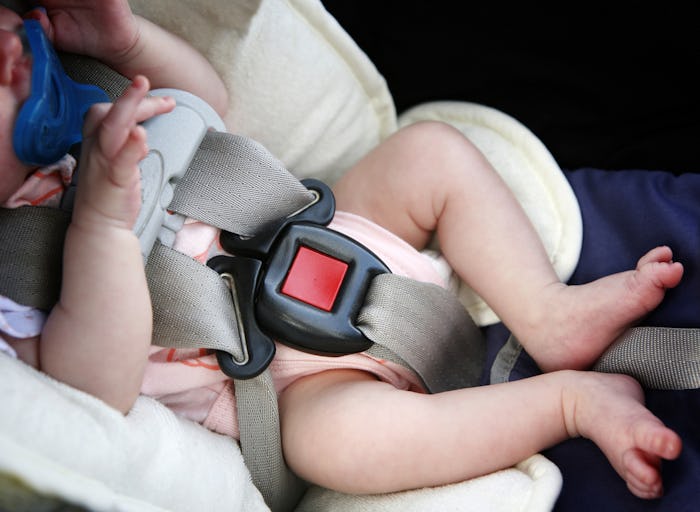News
Everything You Need To Know To Make Sure Your Donated Car Seat Is Safe
Car accidents happen every single day, without warning, and every parent wants to make sure their child is protected against harm at all costs by keeping them in their car seat. But car seats can be costly, especially when children outgrow them and parents are forced to purchase new ones every few years. Therefore, some people opt for hand-me-downs to cut down on the costs. Sometimes this route works, but are all donated car seats safe to use?
There are a few things that parents should consider before placing their child in a like-new car seat and heading on the road. Donating your car seat — or having someone donate their car seat to you — is a pretty thoughtful gesture. Car seats can be expensive, with prices ranging from $44 to $500 on Walmart's website, for example. With all of the expenses that accumulate in your child's life so early on, it's understandable that parents might want to cut corners on certain objects. But cutting corners with your child's car seat and taking a donated one might not always be the best decision.
Secondhand, used, or donated car seats are safe to use but only under some stipulations. Consumer Reports provides a helpful quiz to determine if your donated car seat, or the car seat you are considering donating, is safe to use or give to someone else.
As previously stated, secondhand or donated car seats may be OK to use if they meet a certain set of requirements. Car seats are meant to protect your child from danger during a car crash — so when something could be wrong with the car seat you're considering using, it isn't exactly doing its job. In order for a donated car seat to be deemed safe, according to the National Highway Traffic Safety Administration, the car seat must meet all of these requirements:
- It must have not been involved in a moderate to severe crash
- It must not be expired
- It must not have been recalled
- It must have all parts (or any missing original parts must be replaced)
- It must come with an instruction book (or have the instruction book replaced)
All of these components and requirements are vital to car seat safety. If a car seat has been involved in an accident, the forces from the crash could have "weakened the structural integrity of key components" beyond what you can see, according to Consumer Reports. This is why the NHTSA recommends that car seats be replaced and thrown away after a moderate or severe car crash.
If you do receive a donated car seat, it is imperative that you check the expiration date on the car seat. Manufacturers determine the expiration dates of car seats, according to Very Well, due to changes in technology and the wearing down of materials. Car seats can expire anywhere from six to 10 years after being manufactured and the expiration date can be found on the manufacturer's label, located on the side or base of the car seat.
Checking to see if your secondhand car seat has been recalled is also an incredibly important step before using a donated car seat. Recalls on products like these are meant to protect your child and bring attention to anything that could cause harm in their current car seat. The NHTSA has this very helpful database where you can look up the car seat by manufacturer and see if it has been recalled.
If you're looking to donate your car seat to a friend or charity in need, make sure everything is up to guidelines and standards before going ahead and giving it away. Donated and thrifted car seats can be safe to use, but not every donated or thrifted car seat is. By checking things out and triple checking to make sure everything is indeed OK, you are ensuring that your child stays safe from harm's way.
Watch Romper's new video series, Romper's Doula Diaries:
Check out the entire Romper's Doula Diaries series and other videos on Facebook and the Bustle app across Apple TV, Roku, and Amazon Fire TV.
